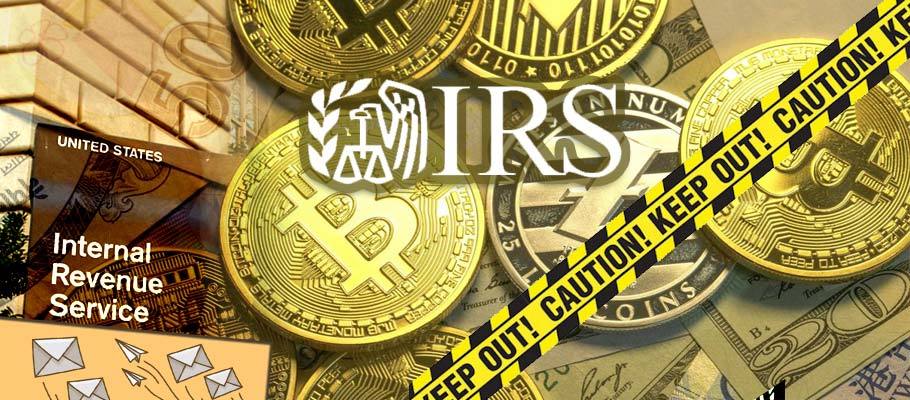
Published: September 1st, 2020
The U.S. Internal Revenue Service (IRS) is dispatching a fresh set of warning letters to cryptocurrency owners. The tax agency prioritizes cryptocurrency on the reporting forms since it has lately ramped up its campaigns on cryptocurrency tax compliance.
The Internal Revenue Service (IRS) of the U.S. has started mailing a fresh round of tax letters to cryptocurrency holders. Several tax services providers have revealed that their customers have received warning letters from the agency similar to the notice sent out to some 10,000 crypto owners in 2019.
According to the IRS procedure, the agency has three kinds of letters that it often sends out. The first, Letter 6173, states the deadline for response. Upon expiry of the notice, the agency usually is within its legal rights to examine the unresponsive individual’s tax accounts.
The other two letters, 6174 and 6174-A, serve to remind taxpayers of their tax obligation.
However, in what seems like an inter-organization contradiction, the Office of the Taxpayer Advocate (TAS), an agency of the Department of Treasury, has noted that the IRS’s letters violate the taxpayers’ rights.
The IRS letters read in part that the agency has information that the targeted taxpayers have one or more accounts containing cryptocurrency whose transactions the owners have not correctly reported.
The letter goes ahead to warn crypto owners to amend their returns and or delinquent filings if they have not accurately reported their cryptocurrency returns on the federal income tax forms.
The IRS letter in question was shared with the media by CoinTracker, an online Bitcoin tax software provider and cryptocurrency portfolio manager. However, the firm’s co-founder, Chandan Lodha, said he could not tell where the federal agency got its crypto owners’ list.
He suspects that Coinbase, the largest cryptocurrency exchange based in the U.S., may have provided the information. Chandan noted that Coinbase is the common denominator among most of the individuals that received the letters. So, it seems likely that the federal agency used the exchange’s list of U.S. clients, he added.
In 2017, a U.S. court granted the IRS the right to investigate the accounts of coin holders who fail to pay taxes arising from crypto transactions. Chandan, however, noted that aside from the Coinbase subpoena data, the agency receives 1099 reports annually. The document lists crypto users enrolled in the exchanges.
Moreover, the tax agency has subpoenaed other crypto bourses, including non-U.S.-based exchanges such as Bitstamp. It also uses Chainalysis and other blockchain analytics software such as Palantir and Coinbase analytics to scour blockchains. So, the agency could have gotten the list of holders from all the four corners, Chandan said.
The IRS has gone as far as trying to de-anonymize on-chain privacy on Bitcoin and cryptocurrency transactions. In the last year, the agency sent out warning letters, which included a cryptocurrency query added to Schedule 1. It also issued a new cryptocurrency tax guideline and assembled contractors to help it undertake thorough crypto tax audits.
Chandan noted that just last week, the IRS moved the cryptocurrency tax question to the front page of its form 1040, from Schedule 1.
These efforts are a follow up of previous actions and campaigns that seek to improve crypto tax compliance. In 2019, the agency notified informing the public that it would send educational material that guides individuals who have not complied. Besides, the document in question instructs users on paying the tax due to the transactions they have undertaken.
By the end of August 2019, more than 10,000 cryptocurrency holders had received the said letters. Speaking then, the IRS Commissioner, Chuck Rettig, impressed upon the taxpayers to take the messages seriously and ensure they review their filings where appropriate. The agency advised the crypto holders to amend past returns to pay back any due taxes, penalties, and interest.
The agency’s crypto compliance campaign was launched in July 2018. The Large Business and International (LB&I) unit of the IRS approved five compliance campaigns during the launch. The crusades were in addition to another 30 that had been initiated earlier.
Among the five was the virtual currency campaign, whose practice area revolved around withholding digital assets and international individual compliance protocols. The articles defining the advocacy say in part that U.S. residents are subject to tax on income from sources that include but are not limited to virtual currency transactions.
The IRS informed taxpayers to watch out for the continuous reviews of the taxation guidelines. However, industry players think that the IRS’s increased focus on the cryptocurrency industry is controversial, given that the agency has only provided piecemeal guidance and regulations on the subject.
Daniel Luchsinger, a cryptocurrency analyst and author at Fintech, said that by the end of 2019, the agency had produced only one guidance document on the subject. And, even the stated article is scant at best.
The guideline only defines digital aspects in the context of taxation. However, it failed to address two longstanding critical issues: such as determining the fair price of a coin if the price indexes differ across exchanges, and proper identification of the cost-basis during a sale or trade, Daniel added.
In Q2 of 2017, the IRS constituted an international tax enforcement group. The focus of the said group is to investigate and build cross-border criminal cases. However, the ten-man team’s task is not only limited to international crimes but also aims to capture individuals and corporations that use cryptocurrency to evade tax.
The group was seen to complement the many cryptocurrency tax guidelines and actions that the IRS developed in Q2 through Q4 2017.
The IRS has ramped up its cryptocurrency tax compliance campaigns, this time around, sending a fresh set of letters encouraging and or warning taxpayers to ensure their obligations are paid in full. Market experts think that IRS’s actions are part of an ongoing campaign to bring cryptocurrency tax into the conventional taxation fold.